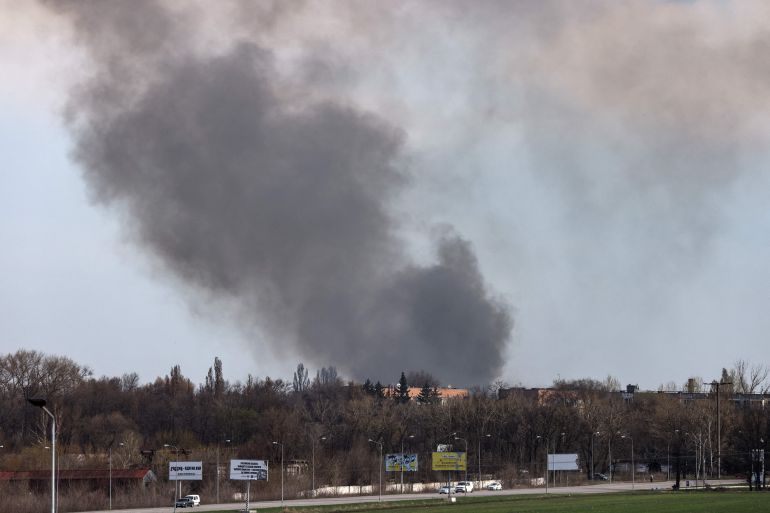Russian rockets destroy airport in Ukrainian city of Dnipro
Reports say the airport in the central Ukrainian city has been completely destroyed in the Russian attack.

Russian missiles destroyed an airport in the Ukrainian city of Dnipro and five emergency workers were injured in the attack.
“There has been another attack on Dnipro airport. There is nothing left of it,” Valentyn Reznichenko, governor of the central Dnipropetrovsk region, said on Sunday.
Keep reading
list of 4 itemsUkraine urges civilians to flee as rail attack toll rises
Russia-Ukraine latest updates: US to send Kyiv ‘weapons it needs’
Ukraine: Zelenskyy seeks peace despite expected Russian attacks
“The airport itself and the infrastructure around it has been destroyed. Rockets keep flying and flying,” Reznichenko said on Telegram.
A missile also hit a building in the city’s Pavlohrad district, and emergency workers were combing through an infrastructure facility that was hit in the town of Zvonetsky.
Reznichenko said attacks on Dnipro city, which lies on the banks of the Dnieper River, intensified on Sunday.
The industrial city of one million people has been targeted by Russian forces since the invasion, but has so far been spared major destruction.
Separately, the head of the Dnipro region council, Mykola Lukashuk, says five staffers of the state emergency service had been wounded by the strike on the airport.
Russia’s Defence Ministry said that missiles fired overnight had destroyed a Ukrainian military base in Zvonetsky that had recently “received reinforcements from foreign mercenaries”.
On Sunday, Ukrainian President Volodymyr Zelenskyy tweeted that he had discussed possible additional sanctions on Russia in a call with German Chancellor Olaf Scholz. Zelenskyy has called for an embargo on imported gas and oil from Russia, but Germany so far resisted pressure to declare an embargo.
Scholz said on Friday that Germany could end Russian oil imports this year, but stopping gas imports would be tougher because the country would need to build infrastructure to import gas from alternative sources.
Russian oil accounts for 25 percent of German imports, down from 35 percent before the February 24 invasion. Gas imports to Germany from Russia have been cut to 40 percent from 55 percent, and hard coal imports to 25 percent from 50 percent.